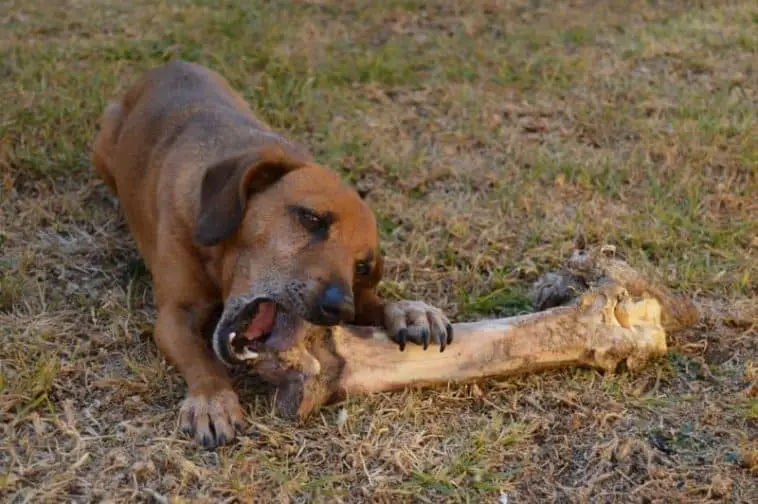Table of Contents
What bones are good for dogs?
The depiction of a dog with a bone is so ingrained in our psyche, that many people would be surprised to hear that recent veterinary advice has been to avoid giving your dog certain types of bone.
As dogs are omnivores, their digestive systems can eat a wide variety of different foods.
In the wild, dogs hunt small animals, and generally consume the entire creature; including its bones.
However, to avoid any dangers to your dog, there are a number of bones you should not give your dog.
The benefits of eating bones for dogs
Bones are a fantastic source of nutrition as they are rich in glucosamine, calcium, phosphorus, and omega 3 fats.
Consuming the right bones can give your dog improved skin and joint health, as well as firmer stools.
In addition to this, chewing can be an immensely satisfying and relaxing experience for raw fed dogs.
Dogs need to chew for their dental care and exercise their jaw muscles, and bones give your dog the opportunity to gnaw.
Do bones contain unsafe bacteria?
Raw bones that not very fresh, can contain bacteria that are hazardous to the health of dogs, such as salmonella and Enterobacteriaceae. Therefore, it is recommended to only use fresh bones.
You can also freeze fresh bones and feed them to your dog later, however, you must defrost them in a sealed container for at least two hours at room temperature, or overnight in the refrigerator. Defrosted bones must be used within 24 hours.
What bones are good for dogs: Which bones can I safely give to my dog?
Large marrow bones such as leg bones, T-bones, and knuckle-bones are all safe bones to give to your dog as they are strong enough to withstand being chewed for a while without cracking.
These should be sourced from cows. Never give your dog pork bones or the bones of poultry and fish. Also, avoid giving your dog any type of rib bones. All these bones can be a choking hazard.
Furthermore, you should not give your dog bones that have a lot of fat on them, as these can be difficult to digest.
The dangers of feeding your dog the wrong bones
Bones that are not able to withstand being gnawed on, can crack and easily splinter into dangerous shards.
These shards can cause your dog several serious health problems, including:
- Choking and suffocation cuts
- Damage to the throat in the form of gashes and scratches
- Stomach perforation
- Blocked intestines
- Cracked teeth
Never feed your dog cooked bones. Once a bone is cooked it becomes very dry and brittle.
Cooked bones can easily splinter into sharp pieces that can cause all of the above health issues.
Raw bones are also much better for your dog’s health as they are moisture-rich, softer, and more flexible compared to cooked bones.
Top tips for choosing the right bones for your dog
- Only use whole raw bones and never cut or sawbones into pieces
- Always select age, breed, experience, and size-appropriate bones for your dog
- Ensure that the bones you give your dog are large enough so that they cannot be swallowed whole
- Do not feed raw bones from a butcher as you cannot be sure of how they have been stored and they may contain harmful bacteria
- Never leave a dog unattended with a bone
- If you have more than one dog, you may wish to separate them before feeding to prevent any disagreements occurring between your pets
- Do not allow children to touch any bone your dog is chewing on, and do not leave them unattended with your dog
- If storing after use, rinse with cold water and store in a plastic bag or container in the fridge
- Always dispose of any bones you have given your dogs after 24 hours
- Offer your dog no more than 1 or 2 raw bones per week, with a few days in between each serving
Recreational bones for dogs
Recreational bones are most commonly knuckle bones and beef leg bones.
Once these large bones have been chewed down to small chunks, they must be immediately disposed of, to avoid becoming a choking hazard.
You can also purchase artificially made calcium ‘bones’, although dogs must be supervised at all times when consuming them as they can splinter.
Verts have also warned of the dangers of giving dogs rawhide chews, made from the skin of an animal as in some cases, they are produced using harmful chemicals such as bleach, hydrogen peroxide, and even arsenic.
As a dog lover and owner, it is our responsibility to ensure that are pets are kept safe when feeding on bones.
By following the advice above, your dog can enjoy the benefits and joys of chewing bones, whilst remaining its happy and healthy self.

